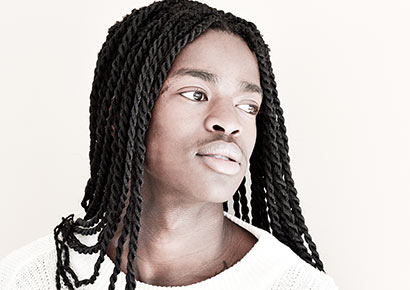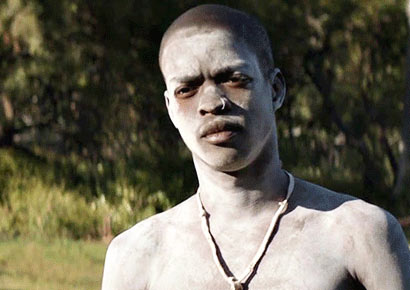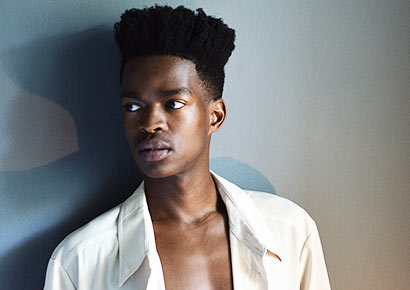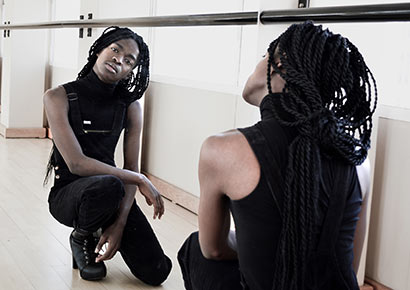Niza Jay – Beyond Inxeba (spoilers)
 To say that Inxeba (The Wound) is a cultural phenomenon is something of an understatement.
To say that Inxeba (The Wound) is a cultural phenomenon is something of an understatement.
The film has simultaneously been hailed as a groundbreaking artistic achievement and also become the subject of protests, death threats and censorship.
In the middle of this cultural, political and social maelstrom are the film’s actors, whose powerful performances have been praised around the world.
One of these standout rising stars is Ndiziphiwe ‘Niza Jay’ Ncoyini. The actor plays the pivotal part of Kwanda, an initiate (umkhwetha) who’s seen by his father as being “too soft”. It’s this city boy’s defiant homosexuality that sparks much of the tension and drama in Inxeba.
Niza, alongside co-star Bongile Mantsai, has been honoured for his work in Inxeba with a South African Film and Television Award (SAFTA) nomination for Best Supporting Actor (feature film).
Amazingly, the film – the most awarded South African production ever – is the Wits Drama graduate’s first professional gig and has led to him being signed with the country’s top talent agent, Moonyeenn Lee. And while Niza’s career is spectacularly on the up, he’s remained refreshingly vocal about his views on the film, his life and his ambitions.
This interview was meant to be published some weeks ago, but following death threats against the actors and Inxeba’s (now-reversed) banning, the producers asked for the article to be held back. Now that it’s back in cinemas, Niza was finally able to speak to us about making Inxeba, growing up and choosing to be a proudly out performer.
Congratulations on your SAFTA nomination, and it’s for your first film role!
It’s truly humbling, but more than anything it’s very encouraging. I am the youngest openly gay actor to be nominated for his first role, and for playing an openly gay character.
That’s hugely significant – we don’t celebrate these things enough in South Africa.
Coming into acting, I always feared that I would have to “suppress” my identity for the sake of my career. To be recognised for a character that means so much to myself and other young black gay men in South Africa and the rest of the world is monumental.
When you were making Inxeba, did you think or know then that the film would become so ‘controversial’?
I challenge everyone to stop describing the film as controversial. We can all do better. That said, I knew that the film would spark conversation, and strong reactions. I always hoped that people would watch the film before passing judgement on it, so as to have an educated critical engagement with it and what it’s saying.
What was it like making the movie? Was it a very intense and heavy environment?
It was wild! We all knew that we had to be respectful about the cultural element and be vigilant about how the love story and the “queer” characters were treated. So that greatly influenced the mood on set, but we had some serious laughs and some very important conversations in and among ourselves as the cast and crew.

Niza Jay in Inxeba
How would you respond to those who say that a depiction of same-sex love should never be included within the sacred initiation space?
Same-sex relations or ANY sexual relations shouldn’t be included in that space – that isn’t the place for any romantic connection. It doesn’t mean it isn’t happening, and it’s happening because men do not live honest lives. They use that environment to release their repressed desires, and that’s what the film is bringing up.
Do you believe that homophobia is behind the protests and the attempt to censor the film?
That and a number of other bigoted attitudes.
How have your family responded to the furore?
My family loves me, and they support me. I come from a very educated family, so they trust that I know what I’m doing and they understand the nature of my work.
Have you personally experienced any threats, intimidation or fear because of your part in the film?
Everyone has experienced that. It’s not any one person’s story. I’ve been subjected to a lot of direct homophobia and misogyny because of how I present myself, and that is the bigger issue.
You mentioned earlier that you had some concerns about being an openly gay actor?
It was the greatest challenge I faced when I decided to act professionally. I have never doubted myself or my talent, but I always feared that my being gay would prevent me from having a successful career because of how the industry is set up. I am hoping that’s going to change now, and that another little feminine gay boy eMthatha can decide to do whatever it is that they love, and not worry about their nature affecting their opportunities.
How would you describe your character Kwanda? What kind of person is he?
Kwanda is ahead of his time. I wish I was tactful as he is. He has a lot to say but he knows when and where to say it. He’s very intelligent, and that’s what makes him Kwanda. He’s not just simply a feisty city boy, but he reasons, and rationalises. Unfortunately he is brought into an environment where people don’t function on reasoning, and that’s why he comes across as abrasive and “disruptive”. That’s what leads to his demise.
How similar are you and Kwanda? Did you bring any personal experiences to creating the character?
Kwanda is a version of me that life didn’t allow to exist. Had certain things in my personal life not happened and had I not made certain choices, I would be Kwanda. Dead and all. I brought my craving for understanding to Kwanda. I always want to understand people, and why things are the way they are, and that’s the quality I gave him, as opposed to just provoking people and situations. Kwanda always asks questions, and even before he gives you the truth, he presents you with the opportunity to think about what he is asking you.

Kwanda represents a very different generation compared to the other men in the film. How do you think your generation differs when it comes to matters of sexuality and masculinity?
We simply differ in how we express it. I know for a fact that the older generation has the same desires and intricacies that we do. It’s just sad that they lived in a time where they were not allowed to explore those parts of themselves, and we can.
What’s been your own experience of growing up gay? Have you been subjected to bullying or negativity from those around you?
Personally, I’ve loved growing up gay. I don’t wish I had any other life. Since I can remember I’ve been teased for being gay, but I pay it no mind. I do believe in standing up for myself at all times, so I don’t take it lying down when it’s direct and aggressive.
What inspired you to become an actor? Was it something that you always wanted to pursue?
I was born to tell stories and acting is one of the ways in which I do that. I believe humans are multi-dimensional and acting allows me to access a lot of my dimensions that would otherwise remain locked off to me. I don’t think I had a choice, keeping my gift to myself would have been a disservice to my maker and anyone who appreciates the true value of storytelling.
Have you had any role models that you’ve been influenced by?
My mom influenced me a lot. She taught me how to be a principled person and a principled artist. Growing up, I looked up to Mam’Leleti Khumalo a lot. I think for the longest time I thought I was Sarafina! I can honestly say she made me fall in love with film. The way she carried that film set a very high standard for how I view stories in general, but also South African stories. I have to give credit to South African actresses because I’ve taken more lessons about the craft from them, more than I have from male performers. Mam’Vatiswa Ndara, Mam’Nambitha Mpumlwana, Sis’Brenda Ngxoli, to name a few, epitomise my acting goals. I also look up to Mam’Brenda Fassie and Beyonce as entertainers and as cultural forces.
You’ve debuted in one of the most high profile South African films ever made. How the hell do you top this?
I don’t want to top The Wound (Inxeba), I’m not interested in that. I don’t want to constantly chase something that’s in the past; life and my maker have greater plans for me. I want to let it stay what it is. No matter what happens, this will always be my debut. I give each project the respect that it deserves, and I will do the same thing with my next project.
 So what do you have planned next?
So what do you have planned next?
What’s next is creating my own work, and strengthening my networks. I don’t want to be at the mercy of producers and casting directors for the rest of my life. The kind of work I strive to create requires me to be very involved in how the final result is realised. I’m working with Thokisasuke Productions, an independent company founded by Asanda Madosi, and an international financier, to create international film and TV content for the next two years. I will be directing two of these projects and writing / co-writing all three.
Amazing! Finally, tell us something surprising about yourself…
I like fixing things and I’ve got really bad handwriting. Like, really bad!
Inxeba, which was shortlisted for an Oscar and won 20 international awards, has been nominated for a total of eights SAFTAs. The film is now on circuit at selected cinemas across South Africa.
- Facebook Messenger
- Total404
Leave a Reply